Black German Identity: Growing Up Black in Germany
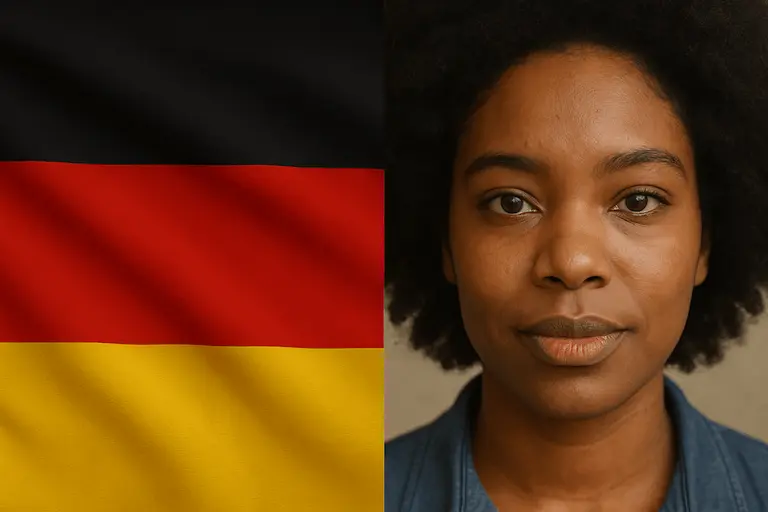
What does it mean to grow up Black in Germany, where your roots and experiences don’t always fit the categories people expect?
For many multicultural families, being born Black in Germany brings both connection and questions, sometimes in the same breath.
As someone who lived in Germany for 30 years, I’ve carried these questions, loud defeats, and quiet wins in my own story.
What you’re about to read isn’t just for research purposes; it’s a lived reality shared by many, even if the specifics vary from country to country.
It sounds simple, right? You’re Black, and you grew up in Germany…. But is it that straightforward?
At first glance, what seems like ‘nothing special' is full of moments, questions, and layers worth naming.
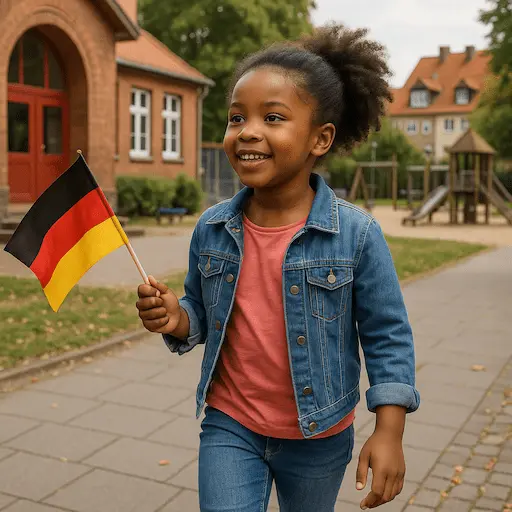
As a Black German, you might find moments of belonging, but also face daily reminders that your identity is seen as “different”, even by those closest to you.
Navigating these realities isn’t always easy. From playground conversations to classroom stories and later, workplaces and friendships, your sense of self often forms at the crossroads of pride and challenge.
Throughout this post, you’ll find reflections, practical insights, and real-life stories—tools for anyone wanting to create more understanding and deeper trust within their own families and communities.
If you're trying to build confidence, find connection, and make sense of your identity in a place where being Black and German, or Black in France, Britain, Italy, or anywhere predominantly white, where your identity is questioned or treated as unusual, feels complicated, you’re not alone.
My story is rooted in Germany, but the pressure to explain who you are is something many people face.
Naming these truths is powerful; when we share them, we create space for better understanding.

Honor Your Past.
Shape Your Legacy.
Download your FREE starter guide on Cultural Heritage & Legacy—created to help you preserve what matters, honor your traditions, and pass your story on with pride.
The Experience of Being Black and German: Growing Up Black in Germany
Growing up in a society where you often stand out can bring deep challenges and unexpected moments of pride.
Each day is a balancing act, holding onto personal confidence while meeting a world that sometimes questions whether you belong.
Navigating Identity in a Predominantly White Society
Being one of the few, or only, Black faces in a classroom, sports team, or small town can feel like you’re constantly on stage.
Stares, comments, or questions like “Where are you really from?” begin early and can wear on your sense of self.
At school, on the playground, or in public spaces, microaggressions can pile up.
While blatant racism still happens, it's the ongoing feeling of being “othered” that shapes how many Black Germans walk through the world.
I was the only Black girl at my school until high school. Even though I had close friends who were Turkish, Iranian, and Moroccan, I was still always the different one.
And as I got older, I had to admit to myself that it had shaped how I saw myself and how I moved through the world.
It started early – kindergarten, in fact. I would later find out that some kids said I smelled like poop, only because of the color of my skin and what they chose to associate that with.
Others would say things like “Regen rückwärts,” their way of avoiding the slur “Neger” while still making sure I knew what they saw- and labeled me as.
It wasn’t just one thing. My skin and hair were different, and the list went on.
There were so many ways I stood out that it became almost impossible to escape an identity crisis.
Yet, within all of that, small moments of connection mattered. A friend who spoke up.
A teacher who saw me and listened. Those moments didn’t fix everything, but left an impact that stayed with me.
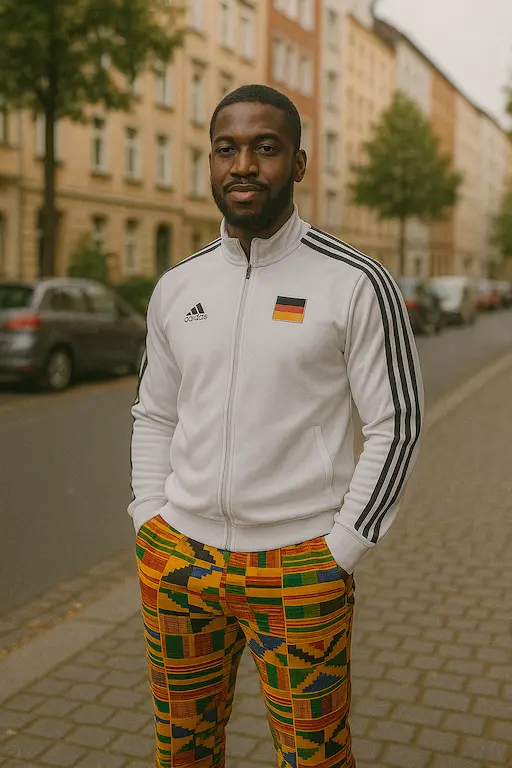
Key realities many face growing up Black in Germany
- Being treated as an outsider
- Explaining your background over and over
- Hearing “Du sprichst aber gut Deutsch” (“You speak German so well”)—even when it’s your first or only language
- Being compared to animals, especially monkeys, in jokes or taunts, a reference that has long been one of the most dehumanizing racial insults used against Black people. Many experience it directly or hear about it early in life.
- Being expected to represent or explain all Black people
- Drawing strength from small acts of solidarity
The Role of Family and Heritage in Building Identity
Home becomes the place where identity is shaped, strengthened, or sometimes silenced.
In multicultural families, combining African and German roots often means mixing languages, food, and customs, and learning to value both.
Children grow up feeling more whole when parents and grandparents openly share their stories, celebrate traditions, and model confidence.
In my case, my parents always made sure we knew who we were at our core – Ghanaians. Part of that was pride, but part of it was knowing we might never be fully acknowledged as German, no matter how long we lived there or how fluent we were.
Representation was part of our everyday life. We had Black dolls, for example, because we lived near an American base where those things were easier to find.
But as much as home affirmed me, it didn’t prepare me for how quickly that affirmation could fade once I stepped outside.
At school, in public, I was still the only ‘one'. And no matter how much pride was built at home, it didn’t always stand firm against the quiet erasure I faced beyond those four walls.
Not every family has strong connections to its heritage, and some may unintentionally or even intentionally send messages that fitting in means leaving behind parts of one's heritage, culture, or identity.
But even when those roots run deep and are built with love, the outside world can still, unfortunately, shape how we see ourselves.
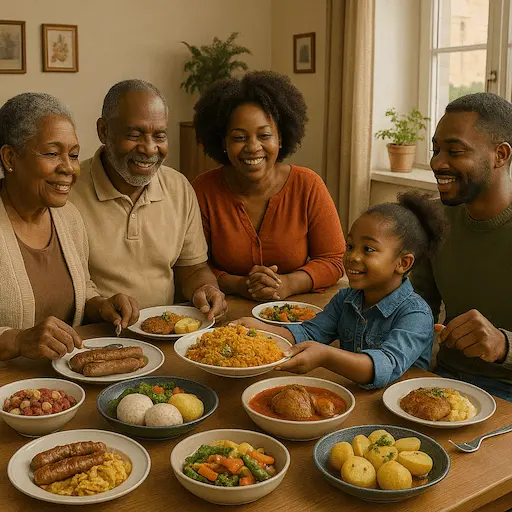
Helpful Family Practices That Support Identity
- Reading diverse books together
- Cooking cultural meals
- Speaking both or all family languages
- Attending community events or cultural festivals
- Telling family stories out loud—not just during holidays
- Watching films or shows in your home language or from your cultural background
- Keeping everyday items around that reflect your identity (art, toys, music, fabrics)
- Involving kids in phone calls or video chats with relatives, even if they only catch parts of the language
- Affirming who they are, so they build confidence even when others call them everything but
- Being intentional about giving them tools to understand, name, and stand strong in their identity
The Historical Context of Being Black in Germany
The past shapes the present. Germany’s history with colonialism, Nazi racial policies, and years of silence around Black experiences has left lasting effects on how Black people are viewed, and how they view themselves.
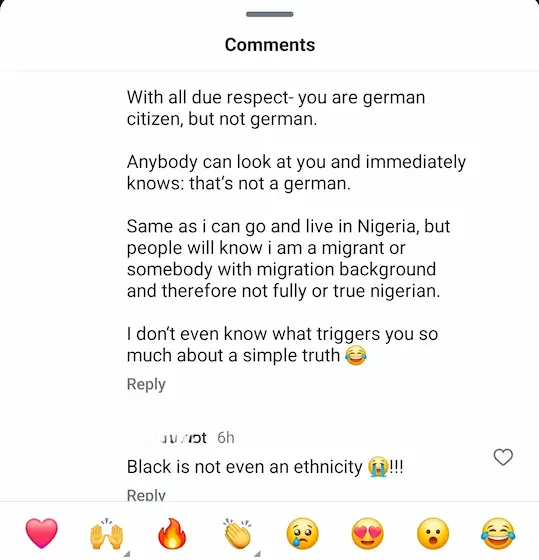
Understanding Germany's Complex History with Race
Black presence in Germany dates back to the colonial period, when Germany held colonies in Africa, such as present-day Namibia, Tanzania, Togo, and Cameroon.
During that time, African students, workers, and soldiers were brought to or traveled to Germany.
Some stayed, forming early Black communities. Others were born there, long before the idea of multicultural Germany even existed.
Over the years, Black Germans faced discrimination, from the “Rhineland Bastards” targeted by Nazi policies to the Afro-German children of American soldiers post-WWII.
Despite the growing number of Black people living in and fully immersed in German society, Black Germans are still not fully counted in official statistics, making their contributions and challenges harder to track and address.
Germany doesn’t officially collect statistics by race or ethnicity, unlike countries like the U.S.
I found out and am not surprised that this policy is rooted in historical reasons, particularly as a response to the racial tracking carried out during the Nazi era.
As a result, there is no official count of how many people in Germany identify as Black, Afro-German, or of African descent.
That gap makes it harder to track specific challenges or recognize the contributions of Black Germans in a visible, measurable way.
However, long-buried stories are being reclaimed with organizations like ISD (Initiative Schwarze Menschen in Deutschland) and increased public discussion.
Black Germans and the Role of Diaspora Communities
Diaspora communities are a vital source of support, pride, and advocacy. They offer safe spaces to talk, learn, and grow together, especially in a society that sometimes struggles to see them as truly German.
Many Black-led organizations are working to build community and push for change, but two of the most well-known are ISD and ADEFRA (Schwarze Frauen in Deutschland).
ISD supports advocacy, education, and visibility for Black people in Germany. ADEFRA centers Black women’s voices, creating space to organize, share stories, and lead from lived experience.
Groups like ISD (Initiative Schwarze Menschen in Deutschland) and ADEFRA (Schwarze Frauen in Deutschland) have been active for decades, creating safe spaces and driving conversations that were long ignored in mainstream German society.
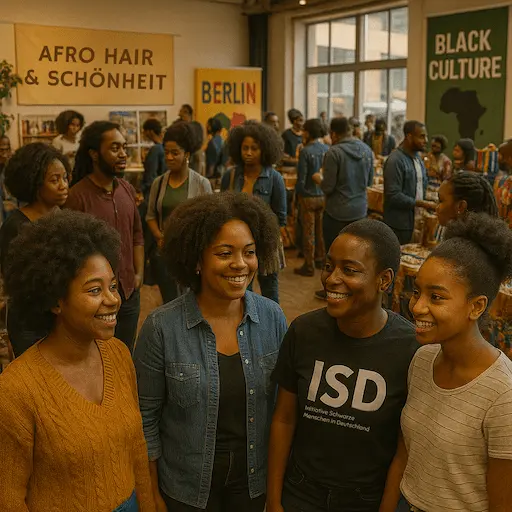
These organizations help:
- Share cultural knowledge
- Organize Black History Month events
- Offer mentoring and legal resources
- Amplify Black German stories through art and activism
- Support intergenerational connection and youth engagement
- Connect and uplift Afro-German small businesses through visibility, networking, and access to spaces that may otherwise be out of reach (economic empowerment)
From cities like Berlin, Frankfurt, Cologne, and Hamburg to smaller communities, they create spaces where identity is affirmed, not questioned.
Their reach extends through workshops, cultural festivals, and local support initiatives that help many feel seen and connected.
There are also many Instagram pages, podcasts, and local networks led by Black Germans who are sharing their stories, work, and cultural reflections.
If you're part of one or know of a smaller group doing meaningful work, feel free to reach out or share in the comments; I’d love to highlight more voices and initiatives here and in future posts.

Defining Black German Identity: Beyond Labels
Legally, if you’re born in Germany to non-German parents, you may or may not receive automatic citizenship depending on your parents’ residency status.
So while some Black people in Germany are citizens, others aren’t, even if they’ve lived there their entire lives.
Ethnically, we’re Black. Culturally, many of us are German. Nationality, ethnicity, and culture don’t always move together, but they all shape how we live and are seen.
The state doesn’t define the term Black German, but it’s widely used by those of us with African heritage who were born or raised in Germany and have deep ties through language, culture, and lived experience.
Still, whether we’re citizens or not, born in Germany or not, many outside our communities don’t just simplify “Black German”, they see it as a threat.
To claim this identity challenges who gets to define Germanness, and that makes some people uncomfortable.
So what are we, by definition? The truth is: labels often fall short. They miss the fluency, the cultural connection, and the emotional stake in a country that may not always claim us back.
That’s where the tension lies, not in who we are but in how others often oversimplify or mislabel us.
The bottom line is that we’re Black Germans. Whether or not we hold citizenship, many of us have lived the German experience our whole lives.
We shouldn’t have to justify the identity we live with every day.
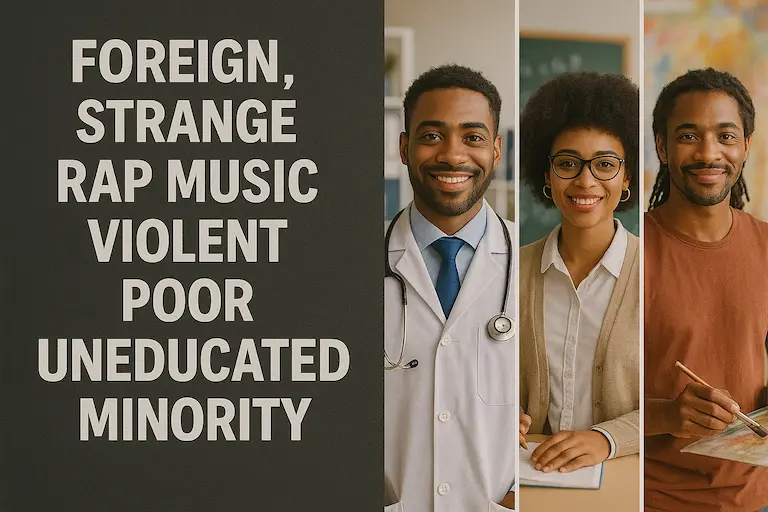
The Importance of Representation for Black Germans
Seeing yourself reflected in media, education, and politics matters. When Black Germans are missing from textbooks, government offices, or television, the message becomes: you don’t belong, or at least not fully.
We were only seen in specific roles, as rappers, athletes, or characters meant to entertain or check a long-standing diversity box.
But we’re also doctors, lawyers, teachers, engineers, bankers, and creatives shaping every corner of society.
Still, it can feel like we must constantly prove we belong in those spaces.
I remember when I started working at one of Germany’s largest banks.
Young girls would approach me and ask how I got the job, not out of doubt but because they had never seen someone like them in that environment.
And I understood why. Before that, I had job applications returned with rejections that didn’t make sense, responses like “We’re no longer hiring,” even after companies had said they were desperate for help.
My photo on the resume told them everything they thought they needed to know.
Things have changed since my job applications 20 years ago, but not enough to feel like the bias is truly gone.
Too often, we’re still left out of the spaces where decisions are made.
That’s why representation isn’t just about visibility, but about access, equity, and rewriting what’s considered “normal.”
We need to be intentional about representation at all levels, not only so others can see us, but so we can see ourselves in places we were once told we didn’t belong.
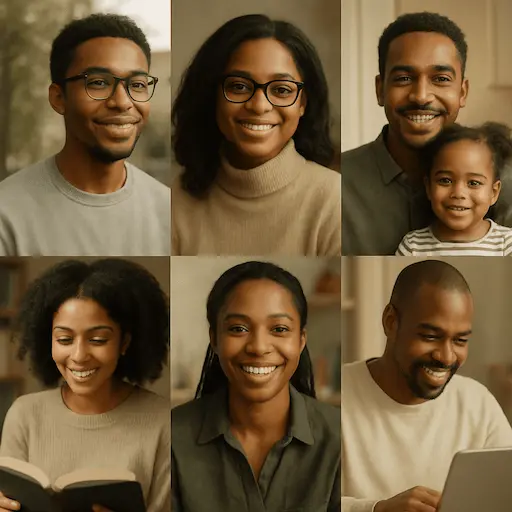
Stereotypes, Assumptions, and Gatekeeping Black Germans Face
We’ve all heard the lines meant to reduce us or shake our place:
“You’re not really German, though, right?”
“Why do you want to be accepted by the white man so bad?”
“You must be lost.”
“They don’t want you there.”
“Stop begging for validation.”
“No matter how you bend it, you’re African, deal with it.”
These aren’t just stereotypes. They’re assumptions dressed up as truth, used to gatekeep who gets to belong and who doesn’t.
They come from people who’ve never had to explain themselves, but feel entitled to question us.
But here’s the truth: no amount of language, roots, or contribution will ever be enough for those who’ve already decided we don’t belong. And still, we do.
We don’t share our stories because we’re confused. We share because we’re clear. We’re not looking for validation. We’re creating space, on our own terms, in our own words.
If you feel led to speak, do. You're not alone if you want to find others walking the same path.
Not to prove anything, but to remind yourself you’re not the problem. The labels, the assumptions, the dismissal, that’s not yours to carry.
Breaking It Down: Stereotypes, Assumptions, and Gatekeeping
- Stereotypes are generalized beliefs, like “Black people can’t be German,” “All Africans are the same,” “Black people smell,” “They only do low-level jobs,” or “Their hair is messy and unkempt.”
- Assumptions are unexamined beliefs people project onto you, like “You must want white validation” or “You’re confused about who you are.”
- Gatekeeping happens when someone uses those beliefs to deny you space, voice, or legitimacy.
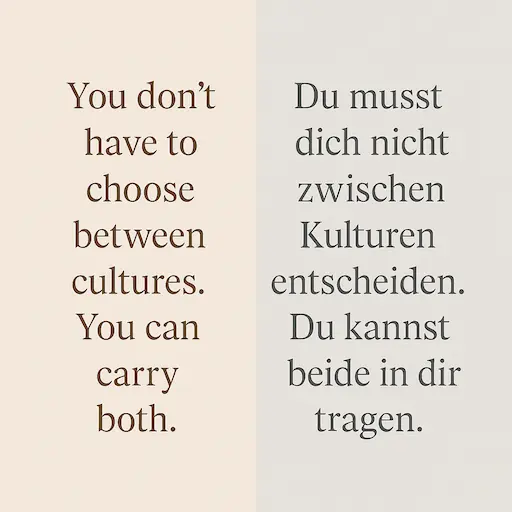
Ways to Challenge These Narratives
- Set boundaries and choose what you want to answer
- Use personal stories to humanize your experience
- Direct people to reliable books, films, or websites
- Respond with calm confidence and curiosity when possible
The more stories we share, the more space we make for new understanding.
How Identity Struggles Differ for Each Generation
Older generations often faced racism in silence. Younger people today are more vocal, naming racism, finding support online, and creating new language around identity.
But those earlier experiences still shaped us. My parents had different struggles navigating life in Germany, but how they were treated also impacted our lives.
I remember my driving instructor, who had also taught my parents years before, calling me “mein Negermädchen.”
When I told him it wasn’t okay, he said, “Don’t be upset. I’m used to saying it and can’t change my ways.”
At the time, I let it go. But I still think about it. I wish I had pushed back harder.
Many of us today speak up more quickly. We don’t just aim for peace—we want truth, correction, and accountability.
It’s not about being confrontational for the sake of it. It’s about refusing to let ignorance slide, just because it’s familiar.
Bridging these generational gaps helps families grow stronger.
When grandparents, parents, and children share their stories honestly, it becomes easier to understand each other and begin healing from the silence, shame, and misunderstandings that shaped us.
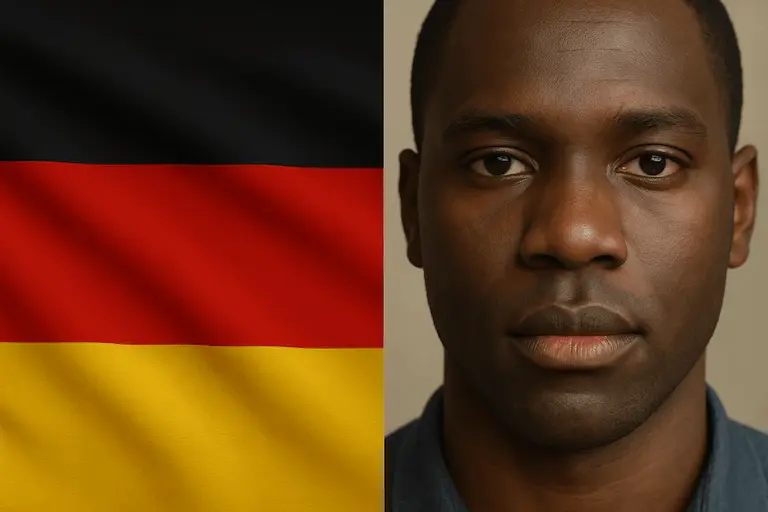
I’m not asking to be seen as German. I am German. – Faith Achiaa
What does it mean to live your truth when so many people question where you belong or how you fit in?
Being born Black in Germany can feel like walking a path few truly understand, where pride and pain, hope and frustration often share the same space.
But every story told, every tradition kept, and every moment of courage matters.
I’m not asking to be seen as German. I am German, and I’m also Ghanaian. I’m multicultural, raised in both, and shaped by both.
Our identity isn’t up for debate because it’s lived by us, not imagined or made up.
There’s an unspoken rule: white Germans are assumed to belong. Black Germans are asked to prove it.
And the demand for proof doesn’t come from genuine curiosity; it comes from misunderstanding, bias, and sometimes racism.
Your voice matters. Share it, celebrate it, and use it to help others feel seen, at home, in Germany, and in their own skin.
IF THIS POST SPOKE TO YOU, EXPLORE MORE OF THE JOURNEY ON OUR SITE.
You'll find free guides, intentional tools, and reflections to support cultural growth and legacy-building.
💬 Looking for connection? Join our Facebook community to continue the conversation.
📌 Pin an image to revisit or share with someone walking a similar path.
Thank you for being here.
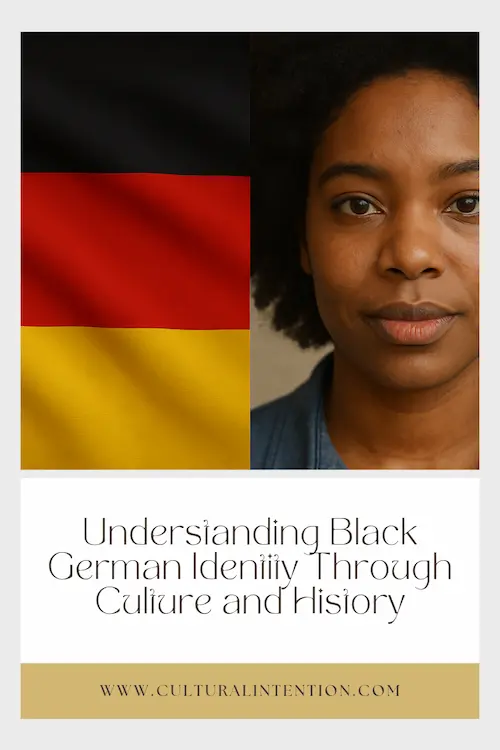
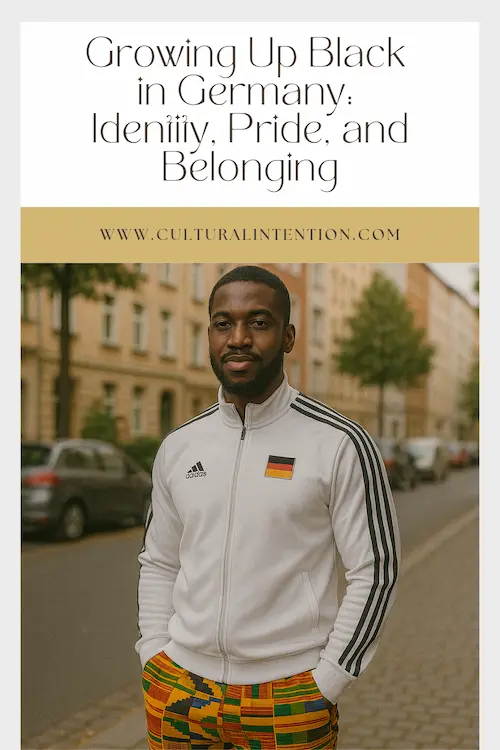
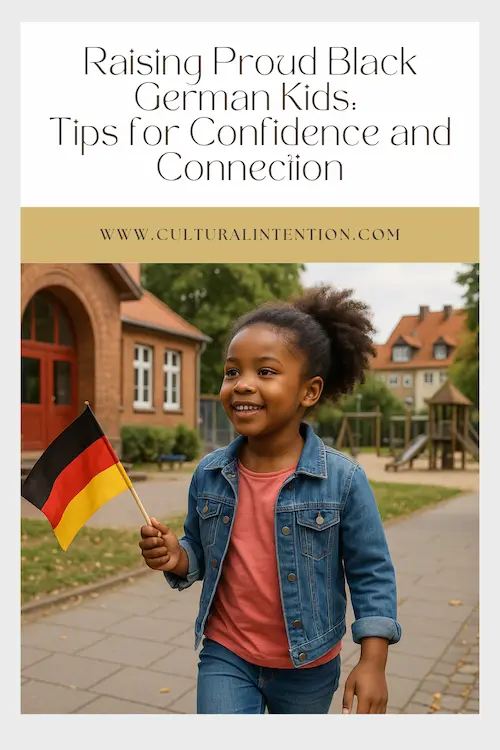
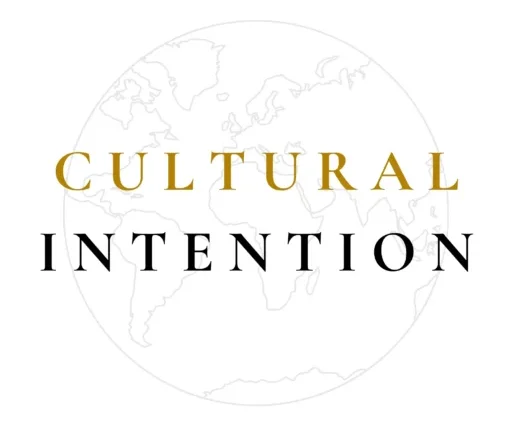






It’s still exasperating to me,as a european,that blacks seem to think that they have a place in germany or any other european country.They don’t.They are african,not european.They simply have no genetic,evolutionary or cultural roots in the continent,except that achieved by unnatural influx or jewish exploitation.It doesn’t matter if you are a citizen,were born and raised there,or can even speak the local language fairly well,if you are not of european blood,you are not european,period.I’ve always thought it perplexing that blacks feel the conscious or unconscious need to put themselves in proximity to white people,even if they don’t necessarily interact with them or must endure “racism”.They do this despite their “pride” in their blackness.I think this is some inherent parasitical weakness unique to blacks and other so-called minorities.Whatever it is,it is destroying europe.I don’t even live or travel in europe anymore because the subversion of european governments is such that there are immigrants everywhere,even represented in the national leadership,despite the fact that they are incompetent,non-white and utterly alien to a white society.The reality is that blacks belong with their own kind.By living in white spaces,they create nothing but mediocrity,conflict and resentment,because of their incompatibility with the host race and culture.Again,blacks are not german.When i see blacks in berlin with their “natural” hair,its conspicuously apparent that they dont belong.I don’t know how long blacks can cling to this desperate delusion.The bottom line is that europe is for europeans,it doesn’t exist to provide a higher standard of living,purpose or sense of belonging for non-whites,nor should it provide a shared sense of greatness,lacking in their own race,culture and history.Germany’s cultural identity and history belongs to the authentic Germanic people of antiquity,blacks have zero connection to that,and it’s nothing they can possibly acquire by association or acculturation.
Thank you Abe for taking the time to read the post. I’m not surprised by your comment, but I am reminded why these conversations, and lived experiences, matter so much.
I was born and raised in Germany. I am German. Not because I am trying to be anything else, but because that is my lived reality. My upbringing, education, language, and cultural framework are shaped by Germany, just as they are shaped by my Ghanaian heritage. That duality does not cancel either one. It strengthens both.
You mention history, but overlook a core truth: Germany’s cultural identity has always evolved. It was shaped by migrations, border shifts, trade, war, colonization, and the presence of Black people dating back centuries through scholarship, military service, diplomacy, and more. To suggest otherwise is not only historically inaccurate, it’s intentionally dismissive.
The idea that belonging is determined solely by race ignores the complexity of citizenship, contribution, and connection. It also assumes whiteness is the only valid reference point for culture, which is both limiting and harmful.
You may choose to remove yourself from spaces that reflect a more diverse Europe. That’s your right. But those of us who live in these spaces, who contribute, build, and belong, are not clinging to delusion. We are confronting the realities of nationhood, legacy, and change. We are also raising children who deserve truth, not revisionism.
Europe is not the possession of a single group. It is a continent shaped by many people, many stories, and yes, many skin tones. That may make some uncomfortable, but it doesn’t make it any less real.
I will continue to speak from my experience. And I will continue to name the erasure, denial, and bigotry that often hide behind “concern” for heritage.
Because cultural intention is not about asking for permission to belong. It’s about naming who we are, with clarity, truth, and no apology. – Faith